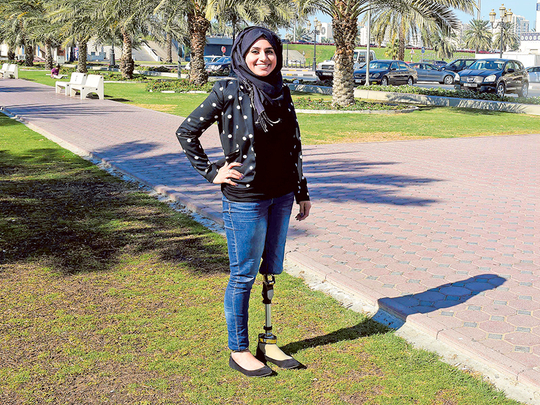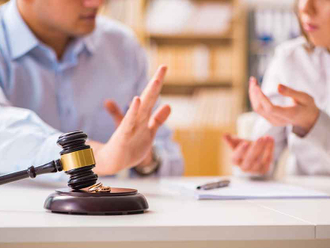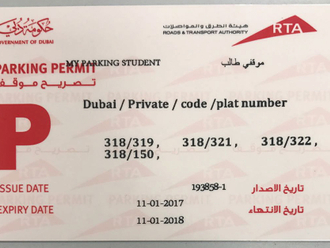
Dubai: People with disabilities have abilities too. This is the message the ‘My Community … A City for Everyone’ campaign wishes to bring home.
An initiative launched by Shaikh Hamdan Bin Mohammad Bin Rashid Al Maktoum, Crown Prince of Dubai, ‘My Community … A City for Everyone’ aims to transform Dubai into an inclusive and disability-friendly city by 2020.
The campaign aims to shed light on the capabilities of persons with disabilities, and to raise awareness among community members about their rights to lead a normal life in an inclusive and integrated society.
“Through this initiative, we believe that the progress of a community begins when all its members realise the power within every person. We want to transform Dubai into a fully inclusive, disability-friendly city by 2020, through programmes and projects aimed at addressing and overcoming all the obstacles, providing equal opportunities and rights, as well as promoting and maintaining social cohesion,” he said.
Five Dubai residents from different nationalities and age groups have been chosen to be faces of the campaign. Each of the five people also represent different types of disability, proving that the initiative aims to integrate everyone in society regardless of their nationality, disability or walk of life.
The ‘My Community … A City for Everyone’ campaign — being presented through newspapers, television, cinemas and outdoor ads — is in accordance with an execution plan to increase community awareness which, in turn, contributes to transforming Dubai into a fully disability-friendly city through the development of an incubator environment that provides equal opportunities, said Dr. Salem Al Shafiei, Director of Policies and Programs for the Rights of Persons with Disabilities at the General Secretariat of the Executive Council of Dubai.
This is in alignment with the goals of Dubai Disability Strategy 2020, which addresses five areas: education, health care, employment, social protection and universal accessibility, for individuals with disabilities.
Gulf News interviewed the five people who are the faces of the campaign — Khalfan Bin Hadher, a visually impaired employee; Omar Khatab, a hearing-impaired student; javelin throw disabled athlete Seham Al Rashidi; young entertainer Ali Al Ameri, and Zainab Al Aqabi, whose physical disability did not prevent her from practising her favourite hobby — horse riding.
Khalfan Bin Hadher
Khalfan Bin Hadher’s visual impairment means he cannot see but he does have a clear vision and determination to help people with visual impairment strive to lead a fulfilling life.
The 26-year-old Emirati, who is studying Human Resources and Business Management at Hamdan Bin Mohammad Smart University, hopes to play an active role in Dubai’s efforts to becoming a disability-friendly emirate.
In fact, Bin Hadher already runs his own podcast (an audio series that can be downloaded or streamed online) targeting people who are visually impaired.
'I don’t walk with a cane, it’s not my style', says Khalfan Bin Hadher.
“In my podcast, I teach people with visual impairment how to use certain technologies and apps that can benefit them. I also made a video teaching people how they can use an app that reads money out loud,” said Bin Hadher, who believes technology is a virtual tool for those with visual impairment provided that it is used correctly.
Community awareness of special needs people and their issues, infrastructure and services that aid their everyday mobility are as important for a fully inclusive environment as having equal job opportunities, said Bin Hadher.
“When companies receive an application from someone with visual impairment, they immediately think of hiring them in a call centre regardless of their specialisation and experience. With the emergence of assistive technology, there are many other opportunities that are now available to them,” said Bin Hadher, who believes that job applications should be more friendly for those with visual impairment.
He also believes that integration in schools and universities is vital “but they should be prepared; they should have teachers who are trained and specialised and they should have the equipment needed.”
With 2016 being declared the Year of Reading, Bin Hadher said that it can be the start of a transformation. “Libraries should provide access to content and their facilities to people with visual disabilities.”
By taking an active role in society and going out to public places, Bin Hadher says he is doing his bit to raise awareness among the public. “I don’t walk with a cane, it’s not my style,” he said, while walking through the halls of his Al Khawaneej home without aid. “When I go out, I walk with friends. We walk together,” he said.
Bin Hadher enjoys playing the piano and travelling abroad where he gets to interact with different cultures and learn about the services they provide to people with disabilities.
Zainab Al Aqabi
Losing her leg following the Iraq war did not stop Zainab Al Aqabi, 25, from becoming a strong-minded, independent woman who strives to inspire others by giving motivational talks.
“In 1990, we moved to a new house in Iraq after the war. There, we found what looked like a construction tool — it was cylindrical and looked like a big nail. Not knowing that it was a bomb, we kept it and used it for seven years as a tool to fix things around the house,” she said.
'We should not lock ourselves at home and expect the world to be perfect without working hard for it ourselves', says Zainab Al Aqabi.
One day, when Al Aqabi was seven, her bike’s handle broke and her father used the ‘cylinder tool’ to fix the handle, and the friction caused by hitting it with a hammer made the bomb go off.
“I lost my leg, my father lost his left hand and had broken bones and my sister lost her middle finger,” recounts Al Aqabi.
"After visiting four to five hospitals, getting her leg amputated and receiving a prosthetic leg, Al Aqabi today is a confident 25-year-old woman who completed her bachelors in pharmaceuticals and works as a medical representative.
Al Aqabi, who loves adventure and extreme sports, believes that people with disabilities should not be deprived of taking part in these activities. She does not buy the argument that a concern for their safety is what bars them from participating. “In many cases, people with disabilities are not allowed to participate in extreme sports [due to their disabilities]. They say that they are worried about safety.”
But she urges a case-by-case assessment. “There should be some sort of assessment and you should not be rejected automatically,” she says.
Though she herself was not allowed to take part in some activities, she was able to skydive.
Al Aqabi is also a horse rider despite facing difficulty in balancing herself on the horse with one leg.
People with disability, she says, have a huge responsibility in making the move towards inclusion. She believes they should participate effectively in society and invest their abilities no matter what the challenges.
“We should not lock ourselves at home and expect the world to be perfect without working hard for it ourselves. This way, we help our countries to have a society that is stronger with great bonds between all.”
Ali Al Ameri
When Ali Al Ameri freestyle in the pool on the roof of his Dubai building, no one can tell that the 15-year-old Iraqi has Down’s syndrome.
Ali’s swimming talent with discovered by his brother, Feras, who decided to help his younger brother hone his talent and thus started a swimming team for people with Down’s syndrome.
'No one should be excluded from society as everyone, disabled or not, has potential to excel in something', says Ali Al Ameri.
“Three years ago, after I felt that Ali likes water. I decided to take courses to become a trainer for people with disabilities and started the team,” says Feras. “My aim was to train him well enough to become eligible for the Paralympics.”
His mission was accomplished two years ago when he registered the team with the Dubai Club for Special Sports, making Ali eligible to represent the UAE in Paralympics.
Today, the team consists of three members with Down’s syndrome who train two to three times a week.
“I love swimming, especially free styling,” says Ali. “I also like participating in competitions.”
He dreams of becoming a horse rider when he grows up.
Feras, who now works at the Rashid Centre for the Disabled where his brother is enrolled, said when it comes to people with Down’s syndrome, Dubai has the facilities to address their requirements. But what they also need in great measure, Feras said, was a larger social awareness of Down’s syndrome needs and issues.
“They should be merged with regular people in schools and jobs. When they turn 20, where should they go? After receiving the education they need, they should not sit at home. I believe more companies should be encouraged to offer jobs to people with disabilities,” said Feras.
He also wishes there were more sports clubs to cater to people with disabilities. In case that is not possible, regular clubs should make place for them.
Ali, on his part, wants to be a part of the crowd, and not stand out due to suffering from Down’s syndrome. No one, said Ali, should be excluded from society as everyone, disabled or not, has potential to excel in something.
Seham Al Rashidi
At the age of six months, Emirati Seham Al Rashidi, 33, was diagnosed with polio but did not receive the vaccines needed, causing half of her body — the left side — to be paralysed for the rest of her life.
Despite being confined to a wheelchair, Al Rashidi’s love for sports inspired her to join the Paralympics, representing not only her country but also giving a voice to people with disabilities.
'When I found out [about the Paralympics], I jumped at the opportunity to participate', says Seham Al Rashidi.
“I have always loved sports. I used to watch the Olympics and other kinds of sports on TV. Once I found out that there is something called Paralympics where people with disabilities can compete, I jumped at the opportunity to participate. This was in 2005,” she said.
Al Rashidi, who participates in discus and javelin throw, trains at the Dubai Club for Special Sports twice a day to improve her ranking.
“I participated in many games around the world and, in 2012, I am proud to say that I earned seventh place worldwide in the world championship in London,” she said.
She believes there has been a great improvement in the infrastructure and services provided for people with disabilities in Dubai.
“I went to the hairdresser the other day and I was able to reach there easily because the building has a ramp and an elevator and the chair is comfortable. This is what a friendly city means, being able to have access to all services and buildings in day-to-day life,” she said.
However, she believes there is room for improvement.
“In many cases, I have faced difficulty because the ramps dedicated for people with disabilities in some of the buildings are too high, I end up using the regular stairs and risk falling or go to a different place altogether,” she said.
Al Rashidi, who works in a government department, believes that while more companies are open to hiring people with disabilities, there should be more effort exerted, especially in the private sector.
Omar Khatab
Hearing-impaired Omar Khatab, 16, dreams of a Dubai where he can communicate with the everyone in sign language.
The Indian student who goes to Rashid Paediatric Therapy Centre lost his hearing as a child after falling ill.
'It would be nice if people can talk to me in sign language', says Omar Khatab.
Khatab, who received care at a late stage, has just started to learn sign language and lip-reading.
His idea of a disability-friendly city, he said, was where everyone understood sign language.
“People don’t understand what I want to say. I have to communicate with them through my phone. When I go to the mall, I have to type on my phone to make them understand what I need. It would be nice if people can talk to me in sign language,” he said through a teacher assistant.
Khatab, who dreams of becoming an artist when he grows up, is also a member of a dancing troupe called the Rashid Stars. The troupe consists of six members with disabilities who dance at big events to prove to the world that they are just as capable as anyone else.
Lilian Noronha, the educator for the hearing-impaired at the centre, commended Dubai’s ambition to become a disability-friendly city, adding that it has made great strides to help people with disabilities.
“The RTA free pass is a great example. Most of our older students use it to communicate for free in the metro and buses,” she said.
Noronha believes that a friendly city is one where people with disabilities are integrated in mainstream schools and the job market.
“People with hearing impairment are easily integrated into mainstream schools, all they need is additional assistance,” said Noronha. “In fact, we rarely have students with hearing impairment enrolled in the centre. We only have six students and they are here because they have an additional disability or because they learnt sign language late,” she said.
However, she said that once they graduate from school, finding a job is difficult for this group of people.
“We need to provide them with more vocational and training skills so they can join the job market. The job sector should also be encouraged to take in people with disabilities,” said Noronha.
The public too, she believes, can contribute to making Dubai’s transition to a fully inclusive city by being more aware of the needs of the disabled. “Don’t shut them out. They may not be able to talk but they can gesture. People should put more effort and patience in talking to them and understanding them.”






